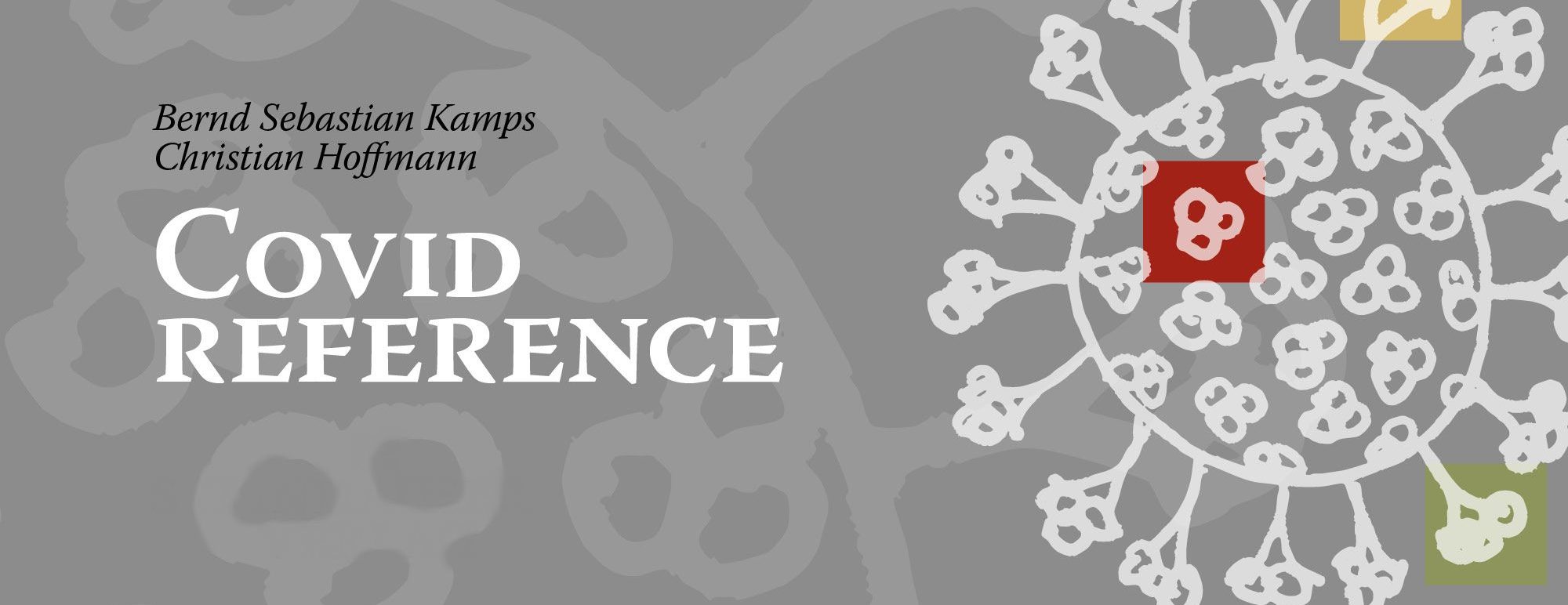Home | Daily TOP 10 | TOP 10 BOOK (PDF)
By Christian Hoffmann &
Bernd S. Kamps
5 September
Immunology
Sattler A, Angermair S, Stockmann H, et al. SARS-CoV-2 specific T-cell responses and correlations with COVID-19 patient predisposition. J Clin Invest. 2020 Aug 24:140965. PubMed: https://pubmed.gov/32833687. Full-text: https://doi.org/10.1172/JCI140965
Are there individual factors that determine the successful (or unsuccessful) mounting of an immune response, deciding between life and death? Could altered T cell function put some patients at risk? Here Arne Sattler et al. analyze cellular responses to three viral proteins and suggest a link between individual patient predisposition with respect to age and comorbidity and impairment of CoV-2 specific Th1-type cellular immunity.
Vaccine
Logunov DY, Dolzhikova IV, Zubkova OV, et al. Safety and immunogenicity of an rAd26 and rAd5 vector-based heterologous prime-boost COVID-19 vaccine in two formulations: two open, non-randomised phase 1/2 studies from Russia. Lancet 2020, published 4 September. Full-text: https://doi.org/10.1016/S0140-6736(20)31866-3
It was high time to see some data on an “approved” vaccine. See also the comment by Naor Bar-Zeev and Tom Inglesby [Bar-Zeev N, Inglesby T. COVID-19 vaccines: early success and remaining challenges. Lancet 2020, published 4 September. Full-text: https://doi.org/10.1016/S0140-6736(20)31867-5].
Fisher KA, Bloomstone SJ, Walter J, et al. Attitudes Toward a Potential SARS-CoV-2 Vaccine: A Survey of U.S. Adults. Ann Intern Med 2020, published 4 September. Full-text: https://doi.org/10.7326/M20-3569
In a few months, when we have a vaccine, will people get vaccinated? In a study of 991 participants, Kimberly Fisher and colleagues found that 57.6% of (n = 571) intended to be vaccinated, 31.6% (n = 313) were not sure, and 10.8% (n = 107) did not intend to be vaccinated. Factors independently associated with vaccine hesitancy (a response of “no” or “not sure”) included younger age, Black race, lower educational attainment, and not having received the influenza vaccine in the prior year. The authors conclude that targeted and multipronged efforts will be needed to increase acceptance of a COVID-19 vaccine.
Treatment
Robinson PC, Richards D, Tanner HL, Feldmann M. Accumulating evidence suggests anti-TNF therapy needs to be given trial priority in COVID-19 treatment. Lancet 2020, published 4 September. Full-text: https://doi.org/10.1016/S2665-9913(20)30309-X
A major component of deteriorating lung function in patients with COVID-19 is capillary leak, a result of inflammation driven by key inflammatory cytokines: TNF, IL-1, IL-6, and vascular endothelial growth factor. Administration of anti-TNF to patients for treatment of autoimmune disease leads to reductions in all of these key inflammatory cytokines. Now Marc Feldmann and colleagues describe the rationale for trialing anti-TNF therapies for the COVID-19-related hyperinflammation (or cytokine release) syndrome. The authors advocate that few current treatments under investigation have this level of supportive evidence.
Furtado RHM, Berwanger O, Fonseca HA, et al. Azithromycin in addition to standard of care versus standard of care alone in the treatment of patients admitted to the hospital with severe COVID-19 in Brazil (COALITION II): a randomised clinical trial. Lancet 2020, published 4 September. Full-text: https://doi.org/10.1016/S0140-6736(20)31862-6
Hydroxychloroquine (HCl) was useless, the combination HCl + azithromycin was useless and azithromycin alone in the treatment of COVID-19 is useless too. In this randomized clinical trial at 57 centers in Brazil, Otavio Berwanger, Remo Furtado and colleagues enrolled patients who needed oxygen supplementation of more than 4 L/min flow, high-flow nasal cannula, or mechanical ventilation (non-invasive or invasive). 214 were assigned to the azithromycin group and 183 to the control group. Azithromycin had no effect.
See also the comment by Catherine Oldenburg and Thuy Doan [Oldenburg CE, Doan T. Azithromycin for severe COVID-19. Lancet 2020, published 4 September. Full-text: https://doi.org/10.1016/S0140-6736(20)31863-8].
Education
Rubin EJ, Baden LR, Morrissey S. Understanding Antibody Testing in Covid-19. Audio interview (23:52). N Engl J Med 2020; 383:e85. Access: https://doi.org/10.1056/NEJMe2028992
The editors discuss antibody-based testing for prior infection with SARS-CoV-2, the interpretation of test results, and the implications for vaccine development.
Spanish
If you read Spanish, read Andrino B, Grasso D, Llaneras K. ¿Qué dicen los datos del coronavirus esta semana? El curso arranca con los casos al alza en más de 30 provincias | La información de la expansión de la COVID-19 en España, actualizada con información de casos, hospitalizados y fallecidos. El primer mapa muestra el ritmo de contagios y la incidencia de casos en cada provincia. Los colores resumen la situación – El País 2020, published every Friday. Full-text: https://elpais.com/sociedad/2020-07-29/el-mapa-del-coronavirus-por-provincias-asi-avanzan-los-casos-en-espana.html?rel=friso-portada
German
If you read German, read Was Sie über Corona-Schnelltests wissen müssen | Ein Ergebnis in wenigen Minuten, egal, wo man gerade ist: Werden Schnelltests schon bald den Verlauf der Pandemie verändern? Das sagt die Forschung | Die Zeit 2020, veröffentlicht am 5. September – Von Florian Schumann und Alisa Schröter
